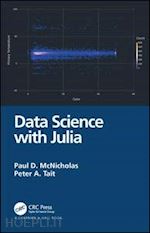"This book is a great way to both start learning data science through the promising Julia language and to become an efficient data scientist."- Professor Charles Bouveyron, INRIA Chair in Data Science, Université Côte d’Azur, Nice, France Julia, an open-source programming language, was created to be as easy to use as languages such as R and Python while also as fast as C and Fortran. An accessible, intuitive, and highly efficient base language with speed that exceeds R and Python, makes Julia a formidable language for data science. Using well known data science methods that will motivate the reader, Data Science with Julia will get readers up to speed on key features of the Julia language and illustrate its facilities for data science and machine learning work. Features: Covers the core components of Julia as well as packages relevant to the input, manipulation and representation of data. Discusses several important topics in data science including supervised and unsupervised learning. Reviews data visualization using the Gadfly package, which was designed to emulate the very popular ggplot2 package in R. Readers will learn how to make many common plots and how to visualize model results. Presents how to optimize Julia code for performance. Will be an ideal source for people who already know R and want to learn how to use Julia (though no previous knowledge of R or any other programming language is required). The advantages of Julia for data science cannot be understated. Besides speed and ease of use, there are already over 1,900 packages available and Julia can interface (either directly or through packages) with libraries written in R, Python, Matlab, C, C++ or Fortran. The book is for senior undergraduates, beginning graduate students, or practicing data scientists who want to learn how to use Julia for data science. "This book is a great way to both start learning data science through the promising Julia language and to become an efficient data scientist." Professor Charles BouveyronINRIA Chair in Data ScienceUniversité Côte d’Azur, Nice, France












